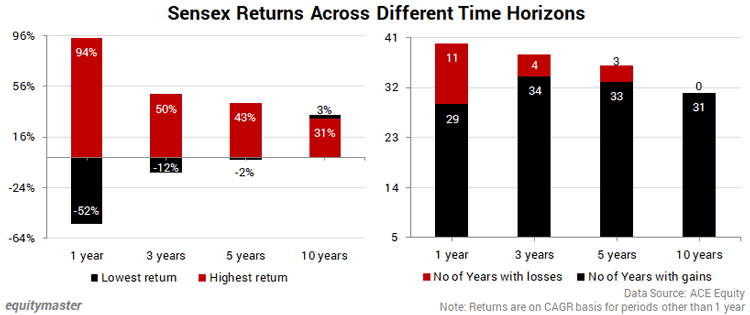A Zero Loss Strategy for Your Portfolio

Last week, I shared with my subscribers, the monthly performance review for the open positions in Hidden Treasure.
14 stocks gained 10% or more during the month.
The biggest gainer was a logistics company, up 91% in a month.
To be sure, this was also one of the hardest hit stocks when the stock market crashed last year. But we didn't press the panic button or follow a blind stop loss limit.
Despite the challenges in the sector and the economy, we had faith in the fundamentals and management.
And our approach was rewarded.
--- Advertisement ---
Investment in securities market are subject to market risks. Read all the related documents carefully before investing
Golden Buying Window to Enter India's Potentially Decade-Long $10 Trillion Bull Run...
The last time it opened... Investors got chance to make 200-300% gains in just 5 years.
And now it's opening up again... offering you a chance to enter india's potentially decade-long $10 trillion bull run...
See This Page for More Details
Details of our SEBI Research Analyst registration are mentioned on our website - www.equitymaster.com
---------------------------------------------------
The reason I'm sharing this with you is to highlight a very critical, but often forgotten aspect of investing - Patience.
Here's a simple analysis that highlights its virtues.

The chart above captures the gains and losses in the Sensex over different time frames, since 1981. The reference date is at the end of the year, and 17 September for this year.
If you were the kind of investor with a time frame of one year, then from 1981-2020, you would have made gains in 29 years.
If you were an investor with a 3 year time horizon, then in 38 such 3-year time zones, you would have made gains 34 times.
If you were an investor with a time horizon of 5 years, then you would have made money in 33 out of 36 such 5-year time periods.
What about an investor with a 10 year time horizon?
--- Advertisement ---
Investment in securities market are subject to market risks. Read all the related documents carefully before investing
A Closed Group of Equitymaster Subscribers Have Been Getting Priority Access to Our Research on Emerging Businesses Stocks
And You're Invited to Join Them
I'm interested
Details of our SEBI Research Analyst registration are mentioned on our website - www.equitymaster.com
---------------------------------------------
Such an investor would have made gains in every period.
In fact, if you look at the returns profile (left chart), it gets even more interesting.
For a 1 year time horizon investor, the biggest gain was 92%, and the sharpest loss 52%.
For an investor with 3 year time horizon, the biggest gain was 50% and the worst loss 12%. These are both in compound i.e. CAGR terms.
Now the 3-year maximum gain may look low compared to 1-year gains. But remember it's compounded returns. This adds the magic of compounding to your returns.
For instance, if you invest Rs 100 for two years, with 92% gains followed by 52% losses, you will end up with only Rs 92.
On the other hand, if the same amount compounds at a much lower 15%, you will end up with Rs 132 at the end of 2 years.
For an investor with 5 year time horizon, the biggest gain is 43% and the worst loss is 2%, both in CAGR terms.
And if you belonged to the rare class of the 10 year horizon investor, your lowest return would still be positive, while your gains could have compounded at 31% CAGR.
You would have made no losses!
Investors pay too much attention to near term price movements and try to time the market.
But what happened in 2020 was a revelation.
Let's say you had access to information that a virus would cause the market to crash. Also you exited all your positions based on that short term prediction.
You would have been right...in the short term.
Yet would have lost the chance of making big money in the post Covid rally.
On the other hand, say your stock picking approach was governed by fundamentals, management quality, and a long term horizon to begin with.
Then the conviction in the businesses would have allowed you to hold on to them, despite the world falling apart. You would have faced a lot of volatility and yet would have emerged a winner.
The Takeaways
Markets are moody.
In the short term, sentiments rule.
In the long term, fundamentals rule.
You will be able to hold stocks for the long term only if your selection is based on conviction, which in turn, is based on a strong investing process.
This kind of conviction cannot be borrowed.
If you are buying stocks based on tips, media headlines, and what your friends and family are buying, you would always be looking for validation.
You're highly likely to enter and exit at the wrong time.
It also takes a great temperament and grit to hold on to stocks when markets correct.
Over exposure to a single stock, a highly concentrated portfolio, or leveraged bets are likely to work against an ideal investing temperament, that focuses on the long term.
Your approach may not make a great topic for day to day conversations. But when the day of reckoning comes, your track record will have the best story to tell.
Stay tuned for more investing insights...
By the way, I have recently recorded a video on how to make better investment decisions using the price to earnings (P/E) ratio.
Watch the video and let me know your thoughts.
Warm regards,
Aditya Vora
Research Analyst, Hidden Treasure
Recent Articles
- Stocks Profiting from the Rise of the Luxury Class in India April 26, 2024
- These stocks benefit the most from the growing opulent class in India.
- A Rare Opportunity to Profit from Pharma Stocks April 25, 2024
- This opportunity can create a lot of wealth. Keep an eye on it.
- Why CE Info and Netweb Technologies Can Go Where NVIDIA Can't... April 24, 2024
- A 100-day programme will look for companies that can fortify India's deeptech foray.
- Can Your Stocks Benefit from Higher Inflation? April 23, 2024
- Higher Inflation is good for these companies.


Equitymaster requests your view! Post a comment on "A Zero Loss Strategy for Your Portfolio". Click here!
Comments are moderated by Equitymaster, in accordance with the Terms of Use, and may not appear
on this article until they have been reviewed and deemed appropriate for posting.
In the meantime, you may want to share this article with your friends!